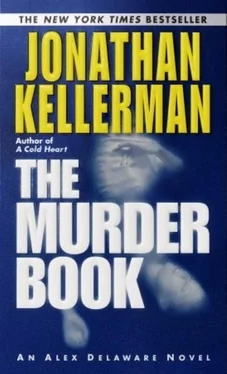Seven blocks west and a half mile south was Walt Obey's address on Muirfield. The billionaire's nest sat at the end of the road, where Muirfield terminated on the southern border of the Wilshire Country Club. No house in sight, just ten-foot stone walls broken by an opaque, black steel gate studded with enormous bolts. Closed circuit TV camera on one post. The implication was a grand place on multiple acres, and Milo flashed to Baron Loetz's spread, neighbor to the Cossack party house. Did Obey spend time on his veranda, sipping gin and enjoying what God had given him?
Eighty years old and still taking meetings with hustlers like the Cossacks. Some big deal on the verge?
He found himself staring at Obey's gate. The TV camera remained immobile. The place was close enough for an athletic guy like John G. to jog over. Obey and Broussard on the veranda? Making plans. Running things. All of a sudden Milo felt very small and vulnerable. He rolled down the window, heard birds peeping, a plink of running water behind Obey's walls. Then the camera began to rotate. An automatic circuit, or maybe his presence had attracted attention. He backed up halfway down the block, whipped a U-turn, and got the hell out of there.
A few minutes later, he was parked on McCadden near Wilshire, cell phone hot against his ear. More DMV finagling gave him other addresses, and he had a look at all of them.
Michael Larner lived in a high-rise condo just east of Westwood, in the Wilshire Corridor. Pink stone and cheesy-looking brick, doorman out in front, an oversize fountain. Son Bradley's Santa Monica Canyon place turned out to be a smallish, blue frame house with stupendous ocean views and a FOR RENT sign out in front. No cars in the driveway, and the gardening looked a little lax, so Brad was living somewhere else.
Garvey Cossack Junior and brother Bob bunked together at a Carolwood address in Holmby Hills, not far, geographically, from Alex's place off Beverly Glen, but a whole different world financially.
Carolwood was a lovely, hilly block, leafy and sinuous, shaded by old-growth trees, one of the highest-priced stretches in L.A. Most of the houses were architectural masterpieces landscaped like botanical gardens, many of them cosseted by greenery and bearing that classy look that only came from durability.
The Cossack brothers' pad was an exceedingly vulgar, blue-tile-roofed and monstrously gabled heap of gray limestone perched atop a scarred dirt hill with no grass or trees in sight. Stone facing, only. The sides were lumpy stucco. Bad trowel job. Cheap-looking white metal fencing and an electric gate partitioned the front of the property from the street, but without benefit of vegetation, the house sat in full view, baking in the sun, puffy flanks glaring white in spots.
A double-sized Dumpster overflowing with trash advertised ongoing construction, but no workers were in sight, drapes covered the windows, and a mini car museum took up the rest of the massive driveway.
Plum-colored Rolls Royce Corniche, black Humvee with blacked-out windows, red (what else?) Ferrari that came as close as Milo had seen to a penis on wheels, a taxi yellow Pantera, a pair of Dodge Vipers, one white with a blue center stripe, the other anthracite gray striped orange, and a white Corvette convertible. All under a drooping, makeshift canvas awning that stretched across listing metal stilts. Off to the side, in the full sun, was a ten-year-old Honda that had to be the maid's wheels.
Big house and all those cars, but no landscaping. Just the kind of eyesore a couple of teenagers would put together if they tumbled into endless cash, and Milo was willing to bet the Cossacks had six figures' worth of stereo equipment inside, along with a state-of-the-art screening room, a pub, a game room or two. He was starting to think of them as a dual case of profound arrested development.
The house was exactly the kind of eyesore that would provoke neighbor complaints in a blue-chip district, meaning now he had something to look for.
He drove downtown to the Hall of Records, made it through the traffic by 2 P.M., and combed through the zoning-board complaint files. Sure enough, three gripes had been lodged against the Cossacks, all by Carolwood residents, irritated about noise and dirt and other indignities caused by "protracted construction." All dismissed for lack of cause.
He moved over to the property files, ran searches on the Cossacks, Walt Obey, both Larners. John G. Broussard.
Obey's holdings were protected by a cadre of holding companies, a firewall that would take weeks, if not months, to break through. Same for the Larners and the Cossacks, although a few pieces of real estate were held privately by each duo. In the case of the Larners it was half a dozen condos in a Marina del Rey building owned jointly by father and son. Sixteen strip malls in low-rent exurbs were registered to the Cossack brothers.
The boys living together, working together. How touching.
Nothing was registered to Sister Caroline.
Shifting gears for a moment, he pulled up Georgie Nemerov's records. The bail bondsman and his mother co-owned a single-family dwelling in Van Nuys that Milo recognized as the family home from twenty years ago, and a six-unit apartment in Granada Hills, also jointly registered to Ivana Nemerov. Whatever Georgie had or hadn't done, building a real estate empire didn't seem part of the equation.
John G. Broussard and his wife- Berna delle - had held on to the house in Ladera Heights as well as three contiguous lots on West 156th Street in Watts. Maybe the chief's or his wife's parents' place, an inheritance.
Once again: no empire. If John G. was trading for something, it wasn't land. Unless he was embedded somewhere in Walt Obey's corporate acreage.
He ran searches on Melinda Waters and mother Eileen and came up empty, was thinking about what else to do when the records clerk came over and told him the building was closing. He left and drove up and down Temple Street, past the place where Pierce Schwinn had spotted Tonya Stumpf strutting. The block was a Music Center parking lot now, filled with its daytime load of municipal workers' and litigants' vehicles, due to the Court Building down the street. Lots of people, lots of movement, but Milo felt out of it- out of the rhythm.
He drove toward home, slowly, not caring about rush-hour toxins, street-work delays, notably stupid driving by what seemed to be fifty percent of his fellow commuters. All the urban niceties that usually drove up his blood pressure and made him wonder why the hell he'd chosen to live like this.
He was sitting at a red light at Highland when his phone rang. Alex's voice said, "I got you. Good."
"What's up?"
"Maybe nothing, but my source- the woman Michael Larner molested- called me again, and I met with her last night. Seems the day Larner made his move on her, he was angry about Willie Burns. Enraged, talking to someone about Burns. Willie had been gone from Achievement House for a few days so it sounds like Larner found out who Burns was, was steamed because Burns disappeared."
"Enraged," said Milo.
"That's how she describes it. She walked into his office just as he got off the phone, said Larner was flushed and agitated. Then he composed himself and turned his attention to her. Which could be more than a coincidence. Harassers and rapists often get stoked by anger. Anyway, it's probably no big deal, but it does fit with our working hypothesis: The Cossack family contracted Larner to hide Caroline until Janie Ingalls's murder cooled down. Burns made contact with Caroline, then split, and the family panicked. But they never found him, he even managed to slip away after his dope arrest, because Boris Nemerov bailed him out immediately. Four months later he ambushed Nemerov."
Читать дальше












